Is your HVAC unit not performing as well as it used to? It might be time to consider a replacement. In this article, we will explore the signs that indicate your HVAC unit needs to be replaced. From decreased Energy efficiency to constant repairs, these symptoms can indicate that your unit is reaching the end of its lifespan. So, if you’re ready to ensure a comfortable and efficient indoor environment, keep reading to learn more about when it’s time for a new HVAC unit.
1. Age of the HVAC Unit
1.1. Lifespan of an HVAC Unit
Your HVAC unit, just like any other appliance in your home, has a limited lifespan. Understanding the average lifespan of an HVAC unit can help you determine if it’s time to consider a replacement. On average, an HVAC unit can last anywhere between 15 to 20 years. However, this lifespan can vary depending on several factors such as regular maintenance, usage patterns, and the quality of the unit.
1.2. Average Lifespan of Different HVAC Units
Different types of HVAC units have varying lifespans. Generally, air conditioning units tend to have a shorter lifespan compared to heating units. Air conditioners typically last around 10 to 15 years, while furnaces and heat pumps can extend up to 20 years or more. It’s important to consider the age of each component in your HVAC system and understand their individual lifespans.
1.3. Signs of Aging in an HVAC Unit
As your HVAC unit ages, it may start showing signs of wear and tear. Look out for these common signs of aging:
- Increased noise during operation.
- Frequent breakdowns and repairs.
- Inconsistent heating or cooling.
- Rising energy bills.
- Unpleasant odors.
- Poor air quality.
- Inefficiency in temperature control.
- Excessive dust or humidity.
- Outdated technology.
If you notice any of these signs, it’s a clear indication that your HVAC unit may be nearing the end of its lifespan and may need to be replaced soon.
2. Frequent Breakdowns and Repairs
2.1. Increased Frequency of Repairs
One of the most evident signs that your HVAC unit is aging is the increased frequency of breakdowns and the need for repairs. If you find yourself calling for HVAC repairs more often than usual, it could be a strong indication that your unit is experiencing significant wear and tear. As an HVAC system ages, its components become more prone to failure and require more frequent attention.
2.2. Rising Repair Costs
Along with the increased frequency of repairs, you may also notice a significant rise in repair costs. Aging HVAC units often require more extensive repairs, and the cost of replacement parts can increase as they become less readily available. Continuously investing in costly repairs can be a signal that it’s time to consider a replacement rather than pouring money into an aging system.
2.3. Unavailability of Replacement Parts
As HVAC technology advances, manufacturers may discontinue certain models or stop producing replacement parts for older units. When your HVAC unit reaches a certain age, finding the required replacement parts can become increasingly challenging and expensive. If you encounter difficulties in finding the necessary components for repairs, it may be an indication that your unit has become outdated and should be replaced.
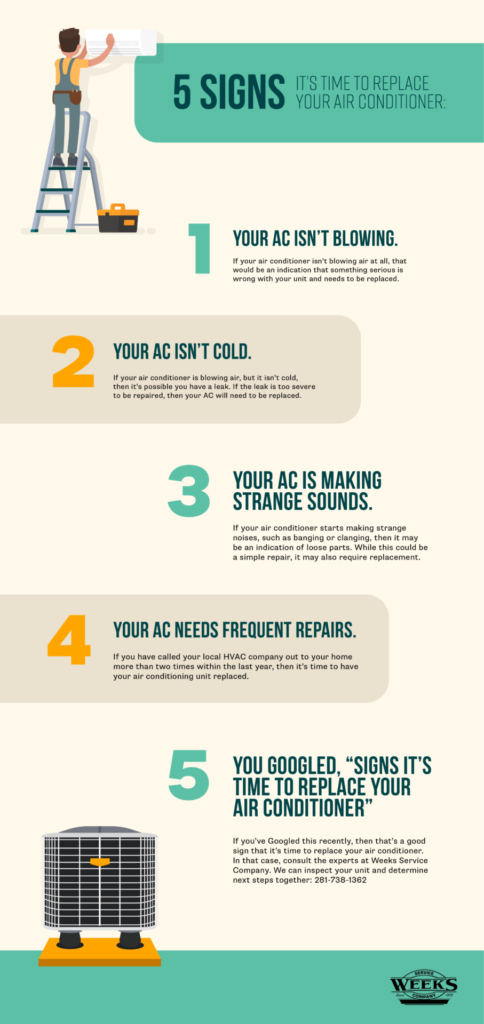
This image is property of weeksservicecompany.com.
3. Inconsistent Heating or Cooling
3.1. Uneven Temperature Distribution
As an HVAC unit ages, it may struggle to maintain consistent temperature distribution throughout your home. You may notice certain areas that are significantly warmer or cooler than others, indicating an underlying issue with the system. This inconsistency can result from worn-out parts, clogged ducts, or a struggling compressor. If your HVAC system is no longer providing uniform heating or cooling, it may be time to think about replacing it.
3.2. Inefficiency in Heating or Cooling
Another sign of an aging HVAC unit is a decline in its efficiency in heating or cooling your home. You may find that your unit takes longer to reach the desired temperature or doesn’t achieve the same level of comfort it once did. This reduced efficiency can be attributed to worn-out components, reduced refrigerant levels, or an inefficient compressor. If your HVAC unit is struggling to maintain optimal temperatures, it may be time to consider a replacement.
3.3. Inadequate Airflow
An aging HVAC unit may also exhibit inadequate airflow, which can lead to reduced comfort in your home. If you notice weak airflow coming out of your vents or certain rooms not receiving sufficient air, it could be a sign of ductwork issues or a failing blower motor. Inadequate airflow not only affects the quality of heating or cooling but can also strain your system, potentially leading to further issues and repairs.
4. Rising Energy Bills
4.1. Understanding Energy Efficiency of HVAC Units
Energy efficiency is an important consideration when it comes to your HVAC unit. Newer models are designed to be more energy-efficient, which can result in significant cost savings on your energy bills. Understanding how energy efficiency works in HVAC units can help you identify if your aging unit is negatively impacting your energy consumption.
4.2. Impact of Aging on Energy Efficiency
As an HVAC unit ages, it tends to become less energy-efficient. Worn-out components, inefficient operation, and reduced system performance can lead to higher energy consumption and, subsequently, rising energy bills. If you notice a steady increase in your energy bills without any corresponding increase in usage or rate hikes, it may be a sign that your aging HVAC unit is no longer operating efficiently.
4.3. How to Identify Energy Efficiency Issues
To identify energy efficiency issues in your HVAC unit, keep an eye on your energy bills over time. If there is a consistent upward trend in your monthly costs, it may be worth considering an energy audit conducted by a professional. They can assess your HVAC system and identify any energy efficiency issues, helping you determine if a replacement is necessary to improve overall energy consumption and reduce your utility bills.
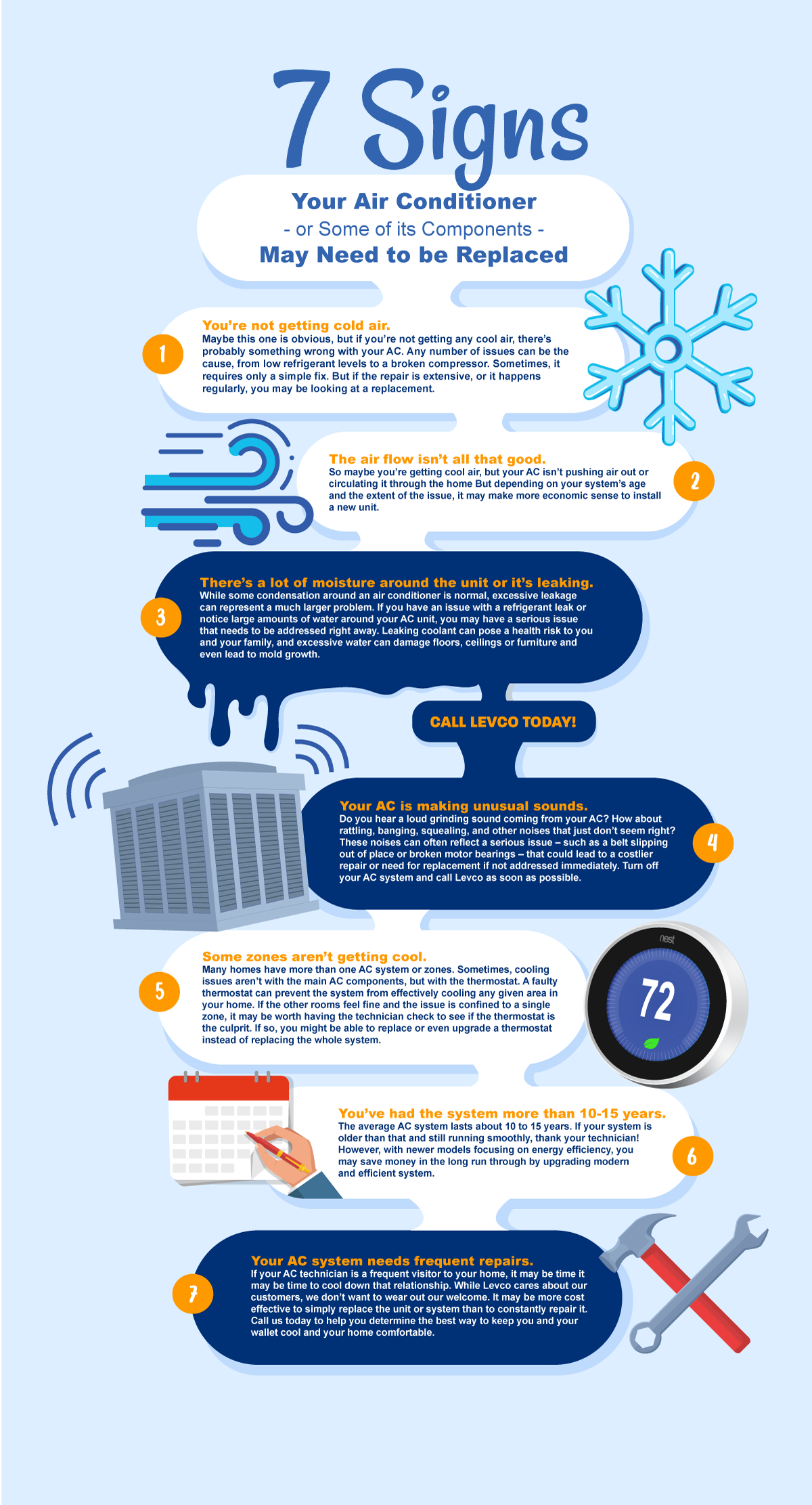
This image is property of www.levcooil.com.
5. Strange Noises
5.1. Common Noises from Aging HVAC Units
As your HVAC unit ages, you may start noticing strange and unusual noises during operation. These noises can be an indication of underlying issues that require attention. Common noises from aging HVAC units include rattling, grinding, squealing, or banging sounds. These noises can be caused by worn-out or loose components, damaged fan blades, or issues with the blower motor.
5.2. Noises Indicating a Need for Replacement
While it’s normal for HVAC units to produce some level of noise during operation, certain noises can indicate a more serious problem and a potential need for replacement. If you hear loud banging or grinding noises, it could be a sign of a severe issue with the internal components of your unit. Ignoring these noises can lead to further damage and potentially costly repairs in the future.
5.3. Importance of Timely Action
Timely action is crucial when it comes to addressing strange noises from your HVAC unit. If you hear any unusual sounds, it’s essential to contact a professional HVAC technician to diagnose the problem. Prompt action can help prevent further damage, extend the lifespan of your unit, and in some cases, avoid the need for a complete replacement.
6. Unpleasant Odors
6.1. Potential Causes of Odors in HVAC Units
Unpleasant odors emanating from your HVAC unit can be a cause for concern. These odors can indicate a range of issues, including mold or mildew growth, accumulation of dirt and debris, or even problems with the electrical components. The age of your HVAC unit can contribute to the development of these odors, especially if regular maintenance and cleaning have been neglected.
6.2. Odors Indicating a Need for Replacement
Certain odors can be a strong indication that your HVAC unit needs to be replaced. If you notice a persistent musty or moldy smell, it could imply that mold or mildew has developed within the unit or the ductwork. Strong burning odors can indicate an electrical issue that poses a safety risk. If these odors persist despite attempts to address them, it’s advisable to consult an HVAC professional to evaluate whether a replacement is necessary.
6.3. Ensuring Indoor Air Quality
Maintaining good indoor air quality is essential for your health and comfort. If your HVAC unit is producing unpleasant odors, it can negatively impact the air quality in your home and potentially lead to respiratory issues or allergies. Replacing an aging unit with newer technology can improve indoor air quality by ensuring proper ventilation, reducing the presence of allergens, and preventing the growth of mold or bacteria.
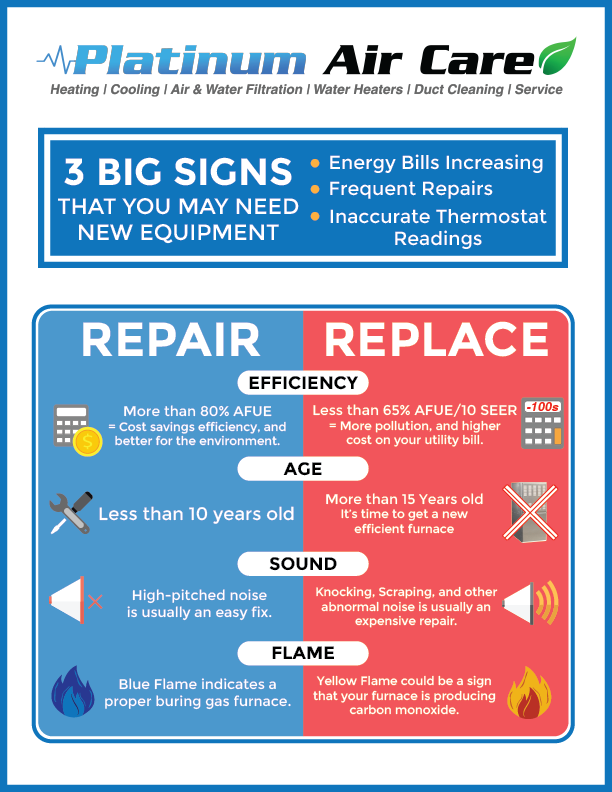
This image is property of images.squarespace-cdn.com.
7. Poor Air Quality
7.1. Understanding Indoor Air Quality
Indoor air quality refers to the cleanliness and healthiness of the air within your home. Poor air quality can have adverse effects on your health, causing respiratory problems, allergies, and other health issues. An aging HVAC unit plays a significant role in maintaining indoor air quality, and addressing any decline in air quality is essential to ensure a healthy living environment.
7.2. Impact of Aging HVAC Units on Air Quality
As an HVAC unit ages, its ability to effectively filter and purify the air may diminish. Clogged filters, dirty ducts, and worn-out components can reduce the unit’s ability to remove pollutants, allergens, and airborne particles from the indoor air. This can result in poor air quality, leading to discomfort, allergies, and potential health risks for you and your family.
7.3. Signs of Poor Air Quality
Signs of poor air quality include excessive dust accumulation, visible mold or mildew growth, lingering odors, and an increase in respiratory issues or allergies among household members. If you notice any of these signs and suspect that your aging HVAC unit is contributing to the decline in air quality, it may be time to consider replacing it with a more efficient and effective system.
8. Inefficiency in Temperature Control
8.1. Difficulty in Achieving Desired Temperatures
An aging HVAC unit may struggle to maintain the desired temperatures in your home. You may find it increasingly challenging to achieve the level of comfort you once had, despite adjusting the thermostat settings. This inefficiency can stem from wearing out of internal components, thermostat malfunctions, or an overall decline in the system’s performance. If you’re continually battling with inconsistent temperatures, it may be time to explore replacement options.
8.2. Inaccurate Thermostat Readings
An inaccurate thermostat can be another factor contributing to temperature control issues. It may display incorrect readings or fail to communicate accurately with your HVAC unit, resulting in inconsistent heating or cooling. If you notice a significant difference between the set temperature on your thermostat and the actual temperature in your home, it is worth considering a replacement or professional thermostat calibration.
8.3. Factors Affecting Temperature Control
Several factors can affect temperature control, including aging components, improper installation, ductwork issues, or even improper insulation in your home. An aging HVAC unit may exacerbate these issues or contribute to their development. It’s important to work closely with an HVAC professional to address temperature control problems and determine if a replacement is necessary to ensure optimal comfort and performance.
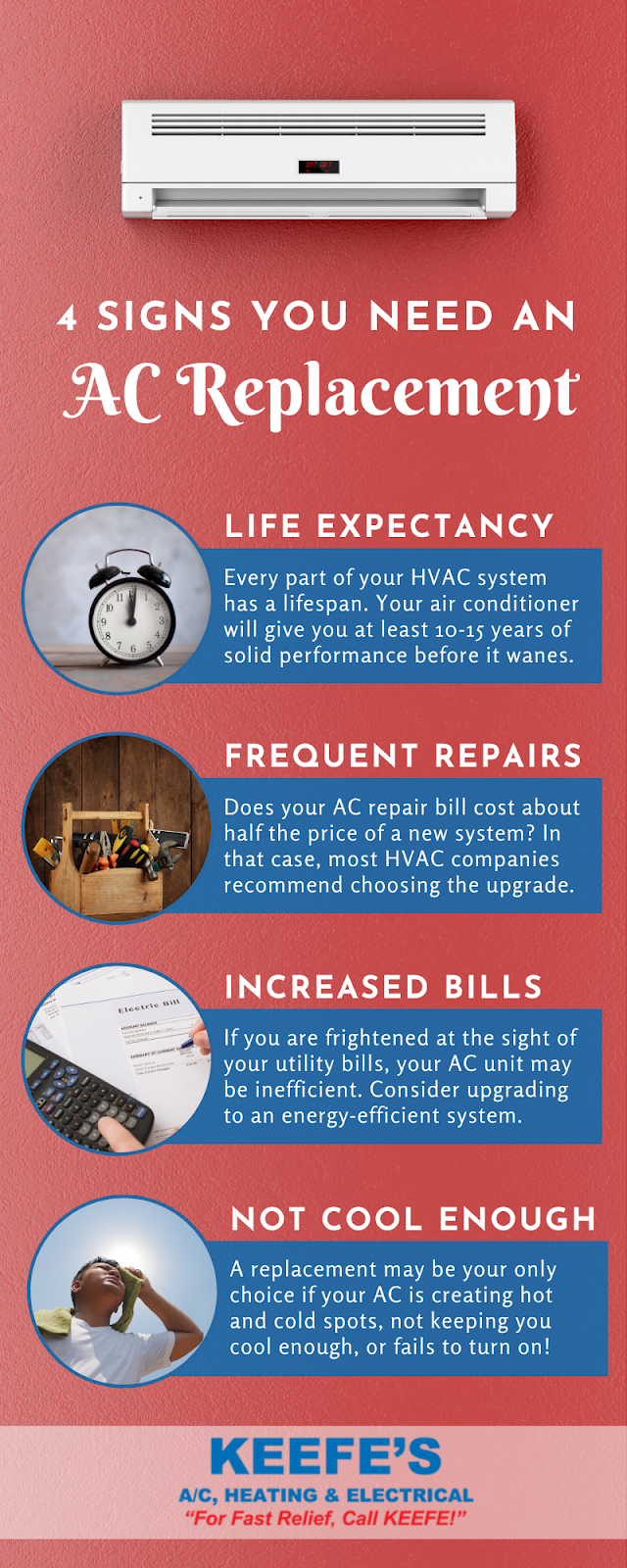
This image is property of www.keefes.com.
9. Excessive Dust or Humidity
9.1. Dust Accumulation
Excessive dust accumulation in your home can be a sign that your HVAC unit is struggling to effectively filter the air. An aging system may have clogged filters or be unable to remove airborne particles, leading to frequent dust buildup. If you find yourself constantly cleaning or dusting your home, it may be an indication that your HVAC unit is no longer functioning optimally and could benefit from a replacement.
9.2. High Humidity Levels
An aging HVAC unit may also struggle to effectively control humidity levels in your home. Increased humidity can lead to a range of issues, including mold growth, musty odors, and a generally uncomfortable living environment. If you consistently experience high humidity levels despite using a properly functioning HVAC system, it may be time to evaluate if the aging unit is causing or contributing to the problem and consider a replacement.
9.3. Impact on Indoor Comfort and Health
Excessive dust and high humidity levels can negatively impact both your comfort and health. Dust can trigger allergies, asthma, and other respiratory issues. Increased humidity can create a breeding ground for mold and bacteria, which can lead to respiratory infections and aggravation of existing health conditions. Addressing these issues by replacing your aging HVAC unit can greatly improve your indoor comfort and promote a healthier living environment.
10. Outdated Technology
10.1. Advancements in HVAC Technology
HVAC technology has made significant advancements in recent years, offering improved energy efficiency, enhanced comfort features, and better control over indoor air quality. By upgrading to a modern HVAC unit, you can benefit from the latest technologies, such as smart thermostats, variable-speed motors, and zone control. These advancements can help optimize your home’s comfort, reduce energy consumption, and improve the overall performance of your HVAC system.
10.2. Obsolete Features and Functions
As your HVAC unit ages, it may not offer the same features and functions as newer models. Older units may lack the ability to adjust temperature settings remotely, control humidity levels, or integrate seamlessly with other smart home devices. If you find yourself missing out on the convenience and comfort provided by these newer features, it may be time to upgrade your system to a more technologically advanced unit.
10.3. Benefits of Upgrading to Modern Units
Upgrading your aging HVAC unit to a modern system can offer various benefits. These include improved energy efficiency, reduced energy consumption, enhanced comfort, better temperature control, higher air quality, and the ability to integrate with other advanced home automation systems. Investing in a new HVAC unit not only improves your daily living experience but also provides long-term savings on energy bills and reduces your carbon footprint.
In conclusion, paying attention to the signs your HVAC unit exhibits is crucial in determining when it’s time for a replacement. The age of the unit, frequent breakdowns, rising repair costs, inconsistent heating or cooling, increasing energy bills, strange noises, unpleasant odors, poor air quality, inefficient temperature control, excessive dust or humidity, and outdated technology are all indicators that your HVAC unit may need to be replaced. By recognizing these signs and taking timely action, you can ensure optimal comfort, energy efficiency, and indoor air quality in your home.
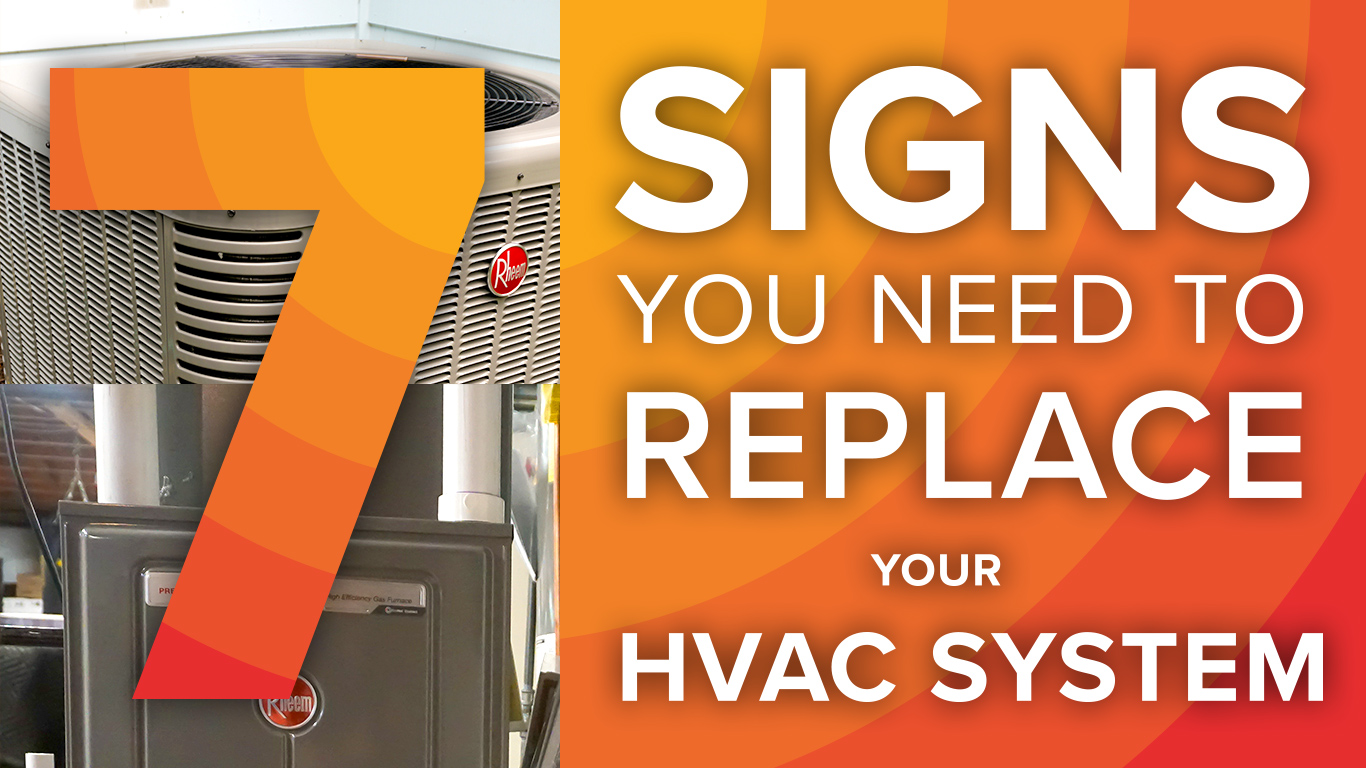
This image is property of alliedexperts.com.
The post Signs Your HVAC Unit Needs to be Replaced appeared first on Diamond Air Design.

